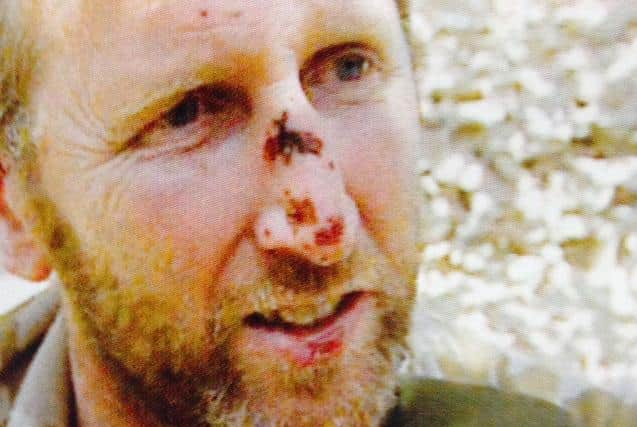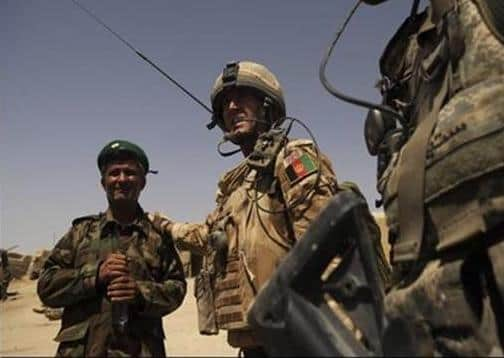Afghanistan’s Taliban surge: Without prompt action all the sacrifices will have been for nothing, says UUP leader Doug Beattie
and live on Freeview channel 276
Ex-Royal Irish Captain Doug Beattie, who served three tours of duty in Afghanistan, believes that the rapid retaking of territory in the country by the Taliban means that it would have been better if they had not gone in at all.
A Military Cross recipient for service in the country, the current UUP leader says a political settlement should have been agreed before western forces withdrew - and if the west does not intervene quickly, the international terrorist threat they originally went in to eliminate could resurface as a global threat once again.
Advertisement
Hide AdAdvertisement
Hide AdThe US-led invasion of Afghanistan in 2001 was ostensibly to dislodge Al-Qaeda and Osama Bin Laden in the wake of 9/11, which it did. The UK announced its withdrawal in 2013 and the US is to complete its withdrawal by the end of August.


Over 2,300 US service personnel have been killed, along with more than 450 UK personnel and hundreds more from other nationalities. Over 60,000 members of the Afghan security forces have been killed and over 120,000 civilians.
However the Taliban has taken more territory back in the last two months than it did since it was ousted in 2001, now controlling around a third of the country - with reports of foriegn Al-Qaeda fighters flocking in to support its advance.
Doug did three tours of duty as a captain, starting in 2006, 2008 and 2011. His mission was to help with reconstruction, governance and capacity building in the Afghan police and military.
Advertisement
Hide AdAdvertisement
Hide Ad“I thought 2006 was particularly bad,” he said. “It was hand-to-hand fighting. It was not standing from some distance away and dropping bombs.”


But 2008 was even worse with Taliban landmines (IEDs) becoming commonplace. “The level of contacts we were having with the enemy and the bitterness and the fighting and the death and the destruction was truly awful.”
In 2011 they were still having daily contact with the enemy but there was rising confidence in the Afghan security forces and population.
On each tour he lost “dozens” of Afghan police and soldiers he was mentoring. On each tour he also lost a number of Royal Irish soldiers, whom he recalls name by name.
Advertisement
Hide AdAdvertisement
Hide AdIt is very important to him that the many civilian casualties are also remembered. “Many were caused by IEDs planted by the Taliban but we were responsible for some as well.
“I remember holding a seven-year-old girl called Shabia in my arms as her life ebbed away in 2008.” She had been injured by a British mortar shell.
“I am not diagnosed with a mental health injury but I know it has an effect on me continuously.”
Asked what he now thinks of all the sacrifices, he says his feelings are like “ever shifting sands”.
Advertisement
Hide AdAdvertisement
Hide Ad“In 2011 I looked at the people I was with and the confidence of the civilians; the confidence of the military and the police; how infrastructure had changed; how many young girls were now going to school; how many lives had been changed by what we had done over the previous years.
“And although what we had done had been pretty brutal as well for everyone involved, I would have said in 2011 that it was worth it.
“But then two years afterwards we announced that we were going to withdraw and things started to go downhill quite quickly. And I remember thinking, ‘We announced we were leaving far too early’.
“But now what I am saying is this: We raised the expectations of a people and we have now let them down. And therefore everything we did was for nothing. It would have been better if we had never gone in there, unless we were going to make sure we were going to be there for the long haul to make sure we had got the place sorted once and for all.”
Advertisement
Hide AdAdvertisement
Hide AdHe added: “It is quite hard to watch the ground where I watched my friends and colleagues and Afghans, civilian and military, shed their lives, only to hand it back [to the Taliban].”
The Taliban is a mixture of drug warlords and foriegn fighters who will have no mercy on civilians, he says. Islamic State are also seeping into the country.
He notes that international forces resolved conflicts in Bosnia and Kosovo with political agreements between factions before western forces withdrew. And then an over-the-horizon NATO force was kept on standby in case of emergency.
“There is no reason this could not be done for Afghanistan. There is an opportunity for the international community to reverse what it has done. But if things stay on the track that they are on now, then everything that was done will have been for nothing.”
Advertisement
Hide AdAdvertisement
Hide AdA similar picture may be emerging in Iraq, he notes. “If the international community does not stand up to this and lean into it then we could have a destabilised middle east and Asia yet again - and eventually we could be forced to react once again.”
MORE NEWS:
A message from the Editor:
Advertisement
Hide AdAdvertisement
Hide AdThank you for reading this story on our website. While I have your attention, I also have an important request to make of you.
With the coronavirus lockdown having a major impact on many of our advertisers - and consequently the revenue we receive - we are more reliant than ever on you taking out a digital subscription.
Subscribe to newsletter.co.uk and enjoy unlimited access to the best Northern Ireland and UK news and information online and on our app. With a digital subscription, you can read more than 5 articles, see fewer ads, enjoy faster load times, and get access to exclusive newsletters and content. Visit https://www.newsletter.co.uk/subscriptions now to sign up.
Our journalism costs money and we rely on advertising, print and digital revenues to help to support them. By supporting us, we are able to support you in providing trusted, fact-checked content for this website.
Ben Lowry
Acting Editor